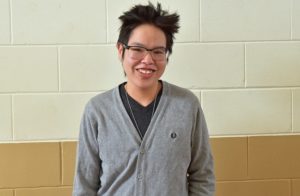Two-Spirit youth speaks up to help build a safe community for Two-Spirit people

By Kelly Anne Smith
NORTH BAY— Ray Hookimaw, a 22-year-old, recently spoke to the public, health care professionals and Ontario Federation of Friendship Centre delegates at the North Bay Indigenous Friendship Centre about building a safe community for Two-Spirit people.
“It’s not the space that is unsafe, it’s people,” he says. “Awareness and education are needed for building healthy relationships with our Two-Spirit community.”
He added that making spaces safer is about people.
“Every person that walks in your door seeking your help is going to need and want something different. You have to ask that individual what their needs and wants are.”
Having a safe connection and having one safe person in your life is important says Hookimaw.
“The safe space is how you talk to people. Having a safe place and how you talk to people is part of the Grandfather Teachings.”
Hookimaw explained how he identifies as a transgender man and Two-Spirit.
“Two-Spirit comes from our culture. What they did for people who claimed they were Two-Spirit, was put them in a lodge with two items, which was a basket and a spear. They would set the lodge on fire. You would run out and grab something. Whatever you grabbed was dearest to you because it’s a burning fire and you would panic,” explains Hookimaw. “A lot of women would have chosen the basket. Men would have chosen the spear. Two-Spirit chooses both…In our culture, Two-Spirits were sought out as leaders, for guidance and healers as well because they have gifts. These gifts were of the understanding that there were Two Spirits in divine life.”
Hookimaw talked of masculine and feminine roles and traits. Two-Spirit people have knowledge of both. But when settlers came over, they brought confusing language with a eurocentrism label on everything.
“They also brought Christianity. Being gay and being different is not allowed in Christianity, unfortunately. I understand Christianity has moral values but it brought a division of things. It went against the Two-Spirit. When you were Two-Spirit back then, no one could tell because everyone had long hair.”
There are a lot of struggles to face says Hookimaw.
“I’m technically in the [Diagnostic and Statistical Manual of Mental Disorders (DSM)] as gender dysphoria. That makes a lot of people uncomfortable. Homophobia and everything that I have faced, that’s not about me. That’s about them and whatever they believe,” he shares. “I know who I was. And I know who I am and that’s how I got so far in my transition. I had to take this on by myself. I couldn’t hold my parents’ hands.”
“I took every expectation of my older self that my parents wanted me to be, that my siblings wanted me to be. But being in a dress at my wedding? No, screw that. I want pants. I want to dance. I want to move,” he continues. “I know who I was at a very young age. The part that I was transitioning out of was dying. For a lot of people around me, I didn’t look this way. I didn’t sound this way. A lot of people still remember that. It was hard because everyone doesn’t want to let go. As much as everyone was struggling around me, it was me who struggled the most. So, I had to let go.”
Hookimaw says it was heart-breaking to come out to his parents.
“My mom makes me feel happy. She first had to get over that disownment and anger. She said it wasn’t about me, it was about her. She wanted me to understand that was a lesson the Creator was giving her— that her children chose her. So, we all have gifts for her. We all have lessons for her,” he recounts. “I knew me through my transition. I do not speak for all trans people but I do speak for visibility and for awareness. Visibility because I did have the opportunity and I’m grateful for the opportunities in this location, to be given doctors, to be given testosterone and to be given travel grants…I’m thankful to be given all those things, because if I was back at home in Attawapiskat, I don’t think I would have been able to transition.”
The North Bay Indigenous Hub (NBIH) along with Nipissing University’s Enji giigdoyang – the Office of Indigenous Initiatives, and the North Bay Indigenous Friendship Centre, hosted the event to help ensure strong connections are made for preventative health and for an understanding of the Two-Spirit perspective. The NBIH partners are Nipissing First Nation, Temagami First Nation, Dokis First Nation and the North Bay Indigenous Friendship Centre.


